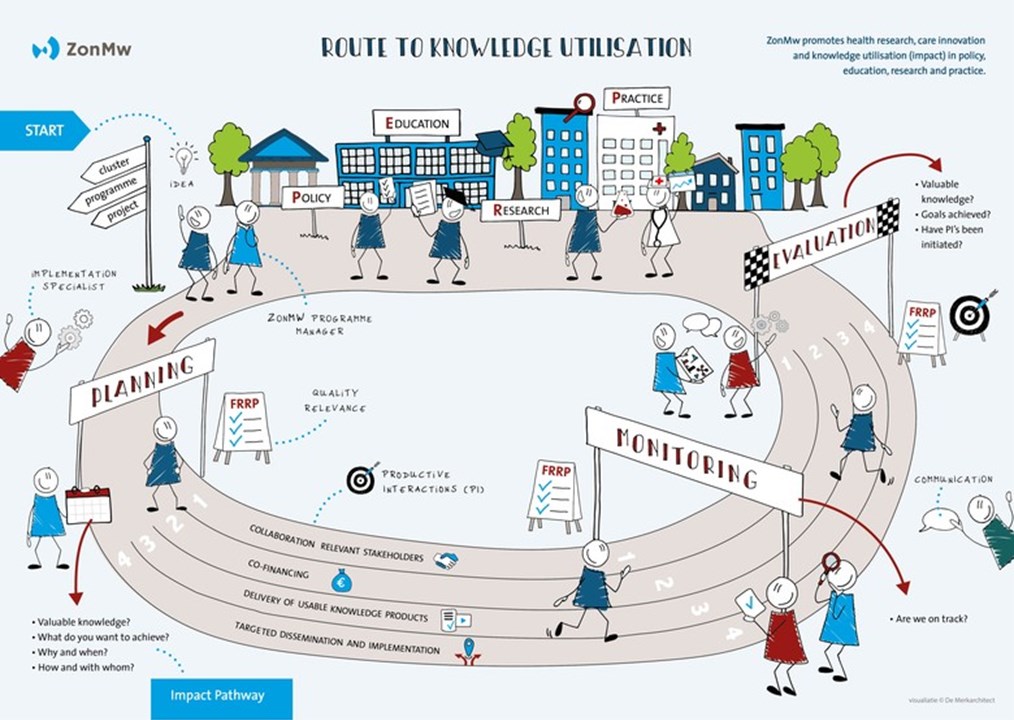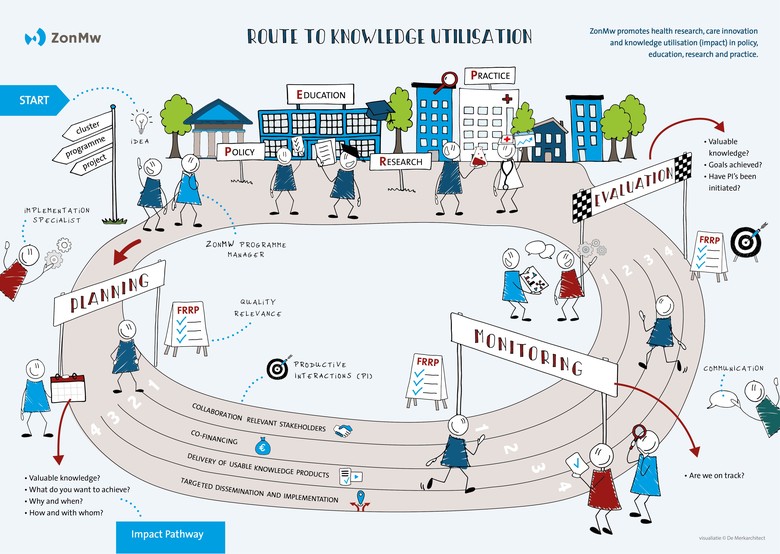Knowledge utilization & creating impact
Introduction
As a research institute of Amsterdam UMC, VU and UvA, APH is an important link between clinical care, scientific research and the extramural care practice in the Amsterdam metropolitan area. Much of the research that is carried out within our institute potentially has a direct impact on practice and society. Like other knowledge institutions, APH is expected to and strives to produce knowledge in line with health challenges our society if facing and to ensure that this knowledge can actually be utilized in healthcare policy and practice and beyond. Yet the path from the academic setting to practice is often unpaved and there are several factors that can influence success.
What is knowledge utilization?
Knowledge utilization is generally seen as an iterative process towards social impact, but is defined and applied in various ways. Policymakers relevant to our field define it as the use of scientific results by people in the field, policymakers, educators and/ or researchers. Key to this non-linear process of creating societal and economic value from knowledge are productive interactions with targeted stakeholders throughout the entire research project. Other terms knowledge institutes and policymakers use are valorization (although somewhat inappropriately derived from Marxist terminology), knowledge circulation and creating impact. But also terms as knowledge translation, exchange, dissemination, implementation, and scaling-up are part of a continuum to describe overlapping and interrelated research on putting various forms of knowledge to use. (Nilsen, 2015)
Why knowledge utilization?
Knowledge utilization adds value to your research and increases its impact outside academia: you make scientific knowledge available to a broader audience, and the partners with whom you collaborate could provide you with relevant cases and offer additional perspectives on the research problem you are addressing / would like to address. Usually collaborating with different parties will enable you to develop new knowledge and insights. Also engaging and partnering up with stakeholders relevant to you research problem also increases your chances of receiving external research funding from funding agencies like ZonMw, NWO, and the EU. And last but not least, you can make a meaningful and sustainable contribution to solutions for societal challenges.
How to utilize or valorize your scientific knowledge?
There is no standard approach to knowledge utilization or valorisation, there are so many different routes you can take. Of course you can learn from the lessons and the experiences of other researchers within or outside APH. We recently organized a few webinars on valorization cases relevant to the public health domain, such as on e-health applications for patients recovering after surgery (check video IkHerstel) and for mental support to diabetic patients (check video MyDiaMate), and on academic collaborative centers on elderly care (check video UNO). You can also get support from IXA, the valorisation office of the Amsterdam knowledge institutes. Together with researchers IXA developed several guides, checklists and training programs that can lead you through the knowledge utilization and valorisation process.
Policymakers as NWO and ZonMw developed several instruments and guidelines as well. Have a look at the route to knowledge utilization ZonMw developed:


Figure 1 - ZonMw’s ‘route to knowledge utilization’ demonstrates the impact across the full range of the knowledge chain. This route distinguishes three core elements: (1) the check on relevance and quality (‘fostering responsible research practices’); (2) the focus on 4 factors that increase the chance of utilization ( ‘productive interactions’); and (3) describing the path from knowledge development to knowledge utilization ( ‘impact pathway’). Knowledge utilization is not a final destination: it is central to all phases of research and can therefore occur at various moments.
Where and when to start?
Experience shows that successful impact initiatives originate from the creativity, curiosity, and intrinsic motivation of individual researchers. ‘The desire to solve the puzzle’ - is often what drives researchers to get and stay involved in these kinds of activities (Lam, 2010). Where and when to start? It is a matter of ‘just getting started and do it’ as early in your research, at the start of the Research Lifecycle in the Design, Plan and Propose part.
In order to develop an idea en to make this idea more concrete you should ask yourself: who benefits from my research? You can further shape this process by answering the four following key questions: What is the idea? What problem or issue does it solve? Who or what benefits from the solution? What is the advantage of your solution compared to existing solutions?
Also consider whether there are any risks associated with the idea or ethical issues or, also very important, the legal aspects, such as agreements with external parties and intellectual property. IXA is there to advise you and provide with practical support: Arrange your Legal affairs.